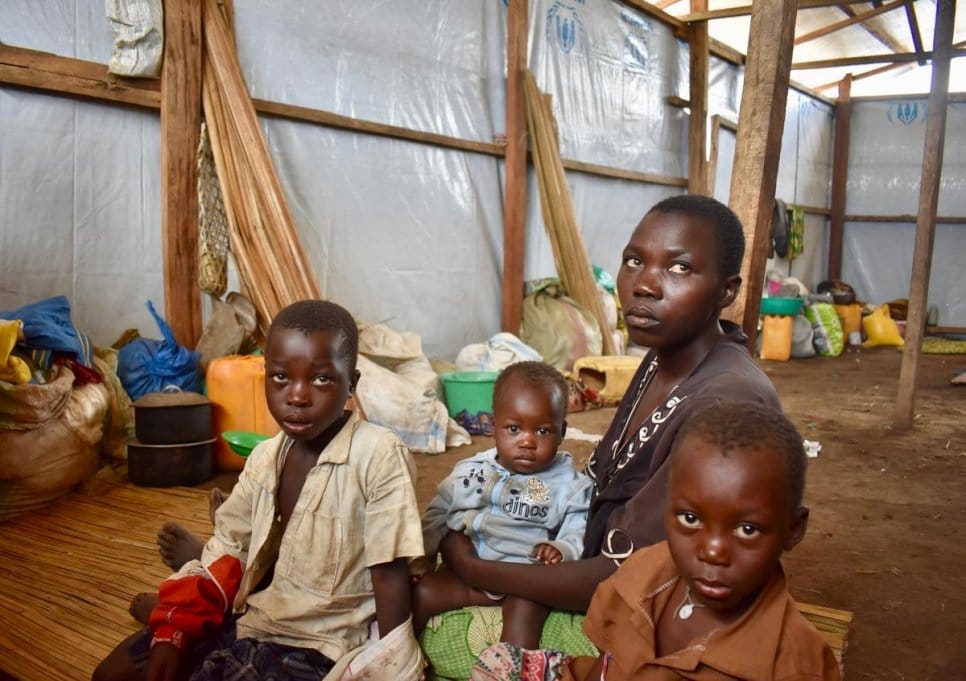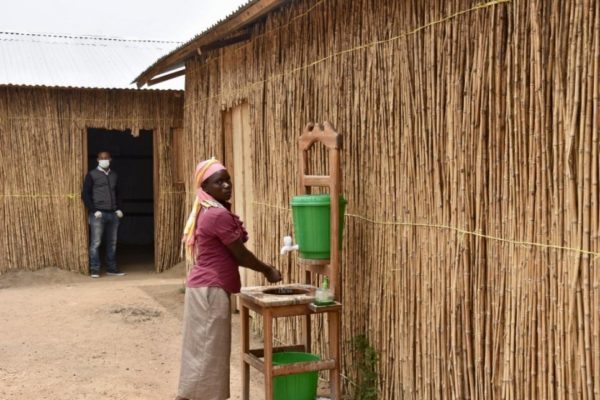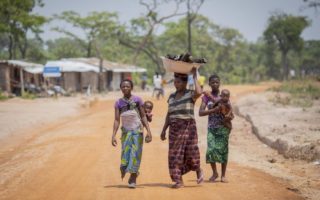
A mother sits with her children at a site for internally displaced people in Bunia, the Democratic Republic of the Congo. © UNHCR/Lena Ellen Becker
This is a summary of what was said by UNHCR spokesperson Charlie Yaxley – to whom quoted text may be attributed – at today’s press briefing at the Palais des Nations in Geneva.
UNHCR, the UN Refugee Agency, remains alarmed at an ongoing surge in violent attacks on local populations in the Ituri province of the Democratic Republic of the Congo (DRC), where more than 200,000 people have been forced to flee their homes in just two months.
UNHCR also remains concerned at the shrinking space for humanitarian work as attacks continue to hamper our ability to reach those in dire need of assistance. UNHCR is calling on all sides involved in the conflict to respect civilian lives and humanitarian work.
Five million people have been uprooted in the DRC including 1.2 million in Ituri province.
Tensions have been on the rise since December 2019 with the launch of a government-led military operation against various armed groups operating in the area. Violence has surged since mid-March as the number of counter-attacks by armed groups have multiplied.
In Ituri province, UNHCR and its partners have recorded more than 3,000 serious human rights violations in Djugu Territory in the last 60 days, arising from almost 50 attacks against the local population on average every day.
Displaced persons have reported acts of extreme violence with at least 274 civilians killed with weapons such as machetes. More than 140 women were raped and almost 8,000 houses set on fire.
Consistent with earlier patterns, the vast majority of those displaced are women and children, many of whom are now living under crowded circumstances with host families. Others are sleeping in the open or in public buildings such as schools which are currently not in use to due to COVID-19 measures.
Both the displaced people and their hosts have been rendered vulnerable by these repetitive attacks, counterattacks and continued violence.
Some displaced, daring to return home, become targeted again as the attacks and threats from armed groups continue. On April 24, four returnees were reported killed in Nyangaray town while another 20 families were kidnapped by an armed group. In Mahagi territory, two returned displaced people were reported to have been buried alive by a group of armed men after being accused of stealing the equivalent of US$6.
Humanitarian access to Djugu and Mahagi territories are heavily restricted. The main roads connecting the province’s capital Bunia with Djugu Territory were fully closed for almost three weeks in April, and still remain too insecure to allow humanitarian access.
UNHCR is concerned for the safety of the displaced people and fears that the lack of humanitarian assistance will have a huge impact as income opportunities have been reduced with the COVID-19 pandemic. Hunger is also a real risk with food prices increasing due to limited supply in both territories.
UNHCR and its partners are working to assist with relief supplies and constructing more shelters for the newly displaced. However, IDP sites are rapidly becoming overcrowded due to the large number of new arrivals and the limited available land. Funding shortages are also affecting our ability to meet the most basic needs of the displaced populations. Our funding appeal of US$154 million for DRC is only 18 per cent funded.
For more information on this topic, please contact:
- In Kinshasa, DRC, Johannes Van Gemund, gemund@unhcr.org, + 243 817 0009 484
- In Kinshasa, DRC, Fabien Faivre, faivre@unhcr.org, + 243 825 443 419
- In Pretoria, Helene Caux, caux@unhcr.org, + 27 82 376 5190
- In Geneva, Charlie Yaxley, yaxley@unhcr.org, +41 795 808 702
- In Geneva, Babar Baloch, baloch@unhcr.org, +41 79 513 9549
- In New York, Kathryn Mahoney, mahoney@unhcr.org, +1 347 443 7646
Originally published by UNHCR on 08 May 2020





